new posts in all blogs
Viewing: Blog Posts Tagged with: Occupy Wall Street, Most Recent at Top [Help]
Results 1 - 25 of 35
How to use this Page
You are viewing the most recent posts tagged with the words: Occupy Wall Street in the JacketFlap blog reader. What is a tag? Think of a tag as a keyword or category label. Tags can both help you find posts on JacketFlap.com as well as provide an easy way for you to "remember" and classify posts for later recall. Try adding a tag yourself by clicking "Add a tag" below a post's header. Scroll down through the list of Recent Posts in the left column and click on a post title that sounds interesting. You can view all posts from a specific blog by clicking the Blog name in the right column, or you can click a 'More Posts from this Blog' link in any individual post.

By: Carolyn Napolitano,
on 9/7/2014
Blog:
OUPblog
(
Login to Add to MyJacketFlap)
JacketFlap tags:
leadership,
volunteers,
community development,
*Featured,
Occupy Wall Street,
Ferguson,
Hahrie Han,
How Organizations Develop Activists,
Books,
Sociology,
Politics,
Organization,
Current Affairs,
protest,
activism,
Add a tag
Now that the National Guard and the national media have left, Ferguson, Missouri is faced with questions about how to heal the sharp power inequities that the tragic death of Michael Brown has made so visible. How can the majority black protestors translate their protests into political power in a town that currently has a virtually all-white power structure?
Recent experiences demonstrate that moving from protest to power is no easy task. For 18 days in 2011, hundreds of thousands of protestors filled Tahrir Square in Egypt to bring down the government of Hosni Mubarak, but three years later, the Egyptian military is back in power. Hundreds of Occupy Wall Street protestors encamped in Zucotti Park for 60 days in the fall of 2011, but few policies resulted that help ameliorate the income inequality they protested. Both of these movements, and many others like them — from Gezi Park in Turkey to the Indignados in Spain — were able to draw hundreds or thousands of people to the streets in a moment of outrage, but lacked the infrastructure to harness that outrage into durable political change.
Protestors in Ferguson risk the same fizzle unless they can build — and maintain — a base of engaged activists and leaders who will persist even after the cameras leave. Transformation of entrenched power structures like a military regime in Egypt, or structures of inequality and state-sanctioned police force in the United States happens only when there is a counterbalancing base of power. That counterbalancing base of power, has to come from the people.
How do people, in these instances, become power? Research shows that building collective power among people depends on transforming people so that they develop their own capacity as leaders to act on injustices they face. Transforming protest into power, in other words, starts with transforming people.
So how are people transformed? Research shows that 79% of activists in the United States report becoming engaged through a civic organization. Every day, thousands of civic organizations across the country, from the NAACP to the Tea Party, work to transform people into activists to win the victories they want.
Yet many of these organizations are still unsure of the best way to build the kind of long-term activist base needed in Ferguson. Many organizations know how to craft messages or leverage big data to find people who will show up for a rally or one event. Few organizations know how to take the people who show up, and transform some of them into citizen leaders who will become the infrastructure that harnesses energy from a week of protest into real change.
I spent two years comparing organizations with strong records of ongoing activism to those with weaker records to try to understand what they do differently. I found that it comes down to their investment in building the motivation, knowledge, and skills of their members. Turning protest into power begins with creating opportunities for people like the residents of Ferguson to exercise their own leadership.
Consider Priscilla, a young organizer working in the rural South to engage people around shutting down coal. When she first started organizing, Priscilla spent all of her time finding people who would show up for town halls, public meetings, and press events. She devoted hours to writing catchy messages and scripts that would get people’s attention, and asked her volunteers, mostly older retirees, to read these routinized scripts into the voicemail of a long list of phone numbers.
After several months of this work, Priscilla was exhausted. She wanted something different. An experienced organizer told her to invest time in developing the leadership of a cadre of volunteers, instead of spending all her time trying to get people to show up to events. Others scoffed at this advice: volunteers don’t want to take on leadership, they said. They want to take action that is easy, makes them feel good, and doesn’t take any time.
Priscilla decided to give it a try. She reached out to a group of likely volunteers to ask them to coffee. She began to get to know them as people. When some agreed to volunteer, she sat them down and explained the larger strategy behind the town hall meeting they were planning, instead of handing them a long list of phone numbers to call. Then, she asked the volunteers what piece of the planning they wanted to be responsible for.
Priscilla started spending her time training and supporting these volunteers in the tasks they’d chosen to oversee. With her help, these volunteers developed their own strategies for getting media for the event, identifying a program of speakers, and leveraging their own social networks to generate turnout. When the big day arrived, more people showed up than Priscilla would have been able to get on her own. More importantly, after the event was over, she also had a group of volunteer leaders exhilarated by their experience running a town hall and eager to do more.
Instead of just getting bodies to fill a room, Priscilla had begun the process of developing leaders. Instead of just coming to one rally, those leaders stayed with and built the campaign that eventually shut down the coal plant in their community.
There are talented organizers on the ground in Ferguson trying to do just what Priscilla did: give residents opportunities to develop the skills and motivation they need to make the change they want. Only by developing those kinds of leaders will organizations in Ferguson develop the infrastructure they need to turn the protest into real power for the residents who feel disconnected from it now.
When Alexis de Tocqueville observed America in the 1830s, he famously wrote that civic organizations are the backbone of our nation because they act as “schools of democracy,” teaching people how to work collectively with others to advance their interests. De Tocqueville is as right today as he was 174 years ago. We have always known that people power democracy. What protests from Occupy to the Arab Spring to Ferguson are teaching us is that democracy can also power people.
Headline image credit: “Occupy Wall Street” by Darwin Yamamoto. CC BY-NC-ND 2.0 via Flickr
The post Moving from protest to power appeared first on OUPblog.


By: KatherineS,
on 3/6/2014
Blog:
OUPblog
(
Login to Add to MyJacketFlap)
JacketFlap tags:
protests,
personal identity,
austerity,
*Featured,
Business & Economics,
arab spring,
protester,
Science & Medicine,
Occupy Wall Street,
eurozone,
Psychology & Neuroscience,
anti-immigration,
Christian von Scheve,
Collective Emotions,
collective identity,
complex affective processes,
Mikko Salmela,
nationalist,
scheve,
mikko,
salmela,
shankbone,
Books,
emotions,
Politics,
Current Affairs,
Spain,
conservative,
EU,
Greece,
Portugal,
financial crisis,
Add a tag
By Mikko Salmela and Christian von Scheve
Nationalist, conservative, and anti-immigration parties as well as political movements have risen or become stronger all over Europe in the aftermath of EU’s financial crisis and its alleged solution, the politics of austerity. This development has been similar in countries like Greece, Portugal, and Spain where radical cuts to public services such as social security and health care have been implemented as a precondition for the bail out loans arranged by the European Central Bank and International Monetary Fund, and in countries such as Finland, France, and the Netherlands that have contributed to the bailout while struggling with the crisis themselves. Together, the downturn that was initiated by the crisis and its management with austerity politics have created an enormous potential of discontent, despair, and anger among Europeans. These collective emotions have fueled protests against governments held responsible for unpopular decisions.
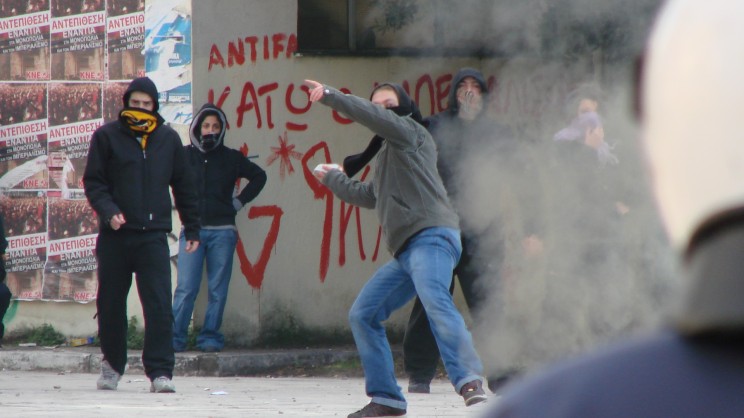
Protests in Greece after austerity cuts in 2008
However, the financial crisis alone cannot fully explain these developments, since they have also gained momentum in countries like Britain, Denmark, Norway, and Sweden that do not belong to the Eurozone and have not directly participated in the bailout programs. Another unresolved question is why protests channel (once again) through the political right, rather than the left that has benefited from dissatisfaction for the last decades? And how is it that political debate across Europe makes increasing use of stereotypes and populist arguments, fueling nationalist resentments?
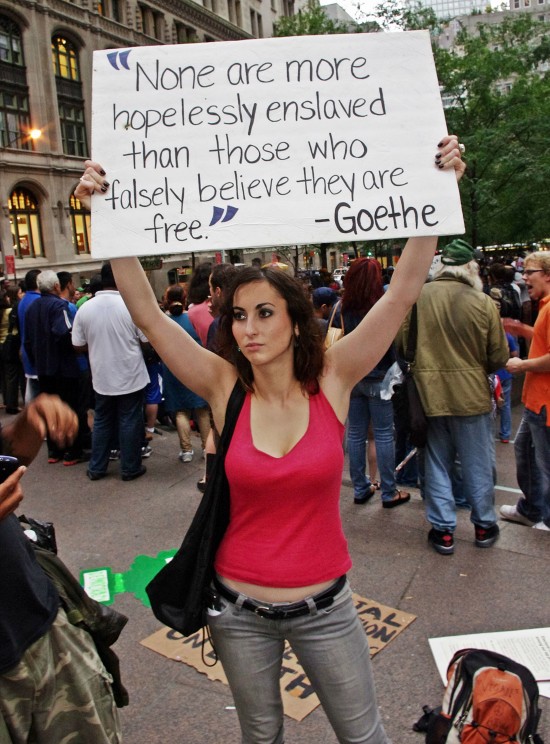
A protester with Occupy Wall Street
One way to look at these issues is through the complex affective processes intertwining with personal and collective identities as well as with fundamental social change. A particularly obvious building block consists of fear and insecurity regarding environmental, economic, cultural, or social changes. At the collective level, both are constructed and shaped in discourse with political parties and various interest groups strategically stirring the emotions of millions of citizens. At the individual level, insecurities manifest themselves as fear of not being able to live up to salient social identities and their inherent values, many of which originate from more secure and affluent times, and as shame about this anticipated or actual inability, especially in competitive market societies where responsibility for success and failure is attributed primarily to the individual. Under these conditions, many tend to emotionally distance themselves from the social identities that inflict shame and other negative feelings, instead seeking meaning and self-esteem from those aspects of identity perceived to be stable and immune to transformation, such as nationality, ethnicity, religion, language, and traditional gender roles – many of which are emphasized by populist and nationalist parties.
The urgent need to better understand the various kinds of collective emotions and their psychological and social repercussions is not only evident by looking at the European crisis and the re-emergence of nationalist movements throughout Europe. Across the globe, collective emotions have been at the center of major social movements and political transformations, Occupy Wall Street and the Arab Spring just being two further vivid examples. Unfortunately, our knowledge of the collective emotional processes underlying these developments is yet sparse. This is in part so because the social and behavioral sciences have only recently begun to systematically address collective emotions in both individual and social terms. The relevance of collective emotions in recent political developments both in Europe and around the globe suggests that it is time to expand the “emotional turn” of sciences to these affective phenomena as well.
Christian von Scheve is Assistant Professor of Sociology at Freie Universität Berlin, where he heads the Research Area Sociology of Emotion at the Institute of Sociology. Mikko Salmela is an Academy Research Fellow at the Helsinki Collegium for Advanced Studies and a member of Finnish Center of Excellence in the Philosophy of Social Sciences. Together they are the authors of Collective Emotions published by Oxford University Press.
Subscribe to the OUPblog via email or RSS.
Subscribe to only psychology articles on the OUPblog via email or RSS.
Image credits: (1) Protests in Greece after austerity cuts in 2008. Photo by Joanna. CC-BY-2.0 via Wikimedia Commons. (2) A protester with Occupy Wall Street. Photo by David Shankbone. CC-BY-3.0 via Wikimedia Commons)
The post Collective emotions and the European crisis appeared first on OUPblog.


The City of New York has settled with the Occupy Wall Street (OWS) movement over the destruction of the OWS Library. The city will pay the OWS Library Working Group $47,000 and pay $186,350 in attorney fees for the movement as well.
Read the complete settlement in the Scribd file embedded below–are you surprised?
The Occupy Wall Street movement and OWS librarians sued New York City in federal court over the destruction of the Occupy Wall Street Library during a late-night raid on Zuccotti Park. According to the lawsuit, the city confiscated 3,600 books on November 15, 2011, but the city only returned 1,003 of the books.
continued…
New Career Opportunities Daily: The best jobs in media.

Activists will celebrate the first year anniversary of the Occupy Wall Street movement today in New York City, gathering around the city in a day of action. Follow this link to read a full PDF of all the planned activities.
The anniversary has also produced a new website, and the activists are urging writers and artists to submit related work. Click here to submit a story for the anniversary blog. You can also follow all the activity on Twitter at the #S17 hashtag.
Here’s more about the page: “This movement can’t happen without your creativity. Please share pictures, videos, drawings, signs, posters, or anything else we can re-post online! … We will do our best to share it with the world. You can also submit media to: OccupyDesign.org & OccuPrint.org. Check out this Design Brief with information for making posters. Check out what others are making on our Media page.”
New Career Opportunities Daily: The best jobs in media.

What book would you carry during a march? For the last few years, activists have created book cover shields to use for protests.
As you can see by the photo embedded above, these “Book Blocs” make a striking image during a protest. The Occupy Wall Street Library will host a workshop on July 29th, showing readers and activists how to use these tools. Here’s more about the class:
Perhaps the most striking example of such deployment of books has been the Book Bloc—phalanxes of protesters hoisting large shields against lines of riot police, each emblazoned with the cover of a book. Book Blocs first appeared in Italy in 2010, and since then they have made their way to London, Spain, California, New York and beyond. For this workshop, we will supply the materials and instructions to make our own book shields. Members of Occupy CUNY and librarians from the People’s Library will be on hand to talk about the history of the Book Bloc and spark conversation about the tactical and symbolic uses of books. Participants are encouraged to drop in for the workshop anytime between 2-5pm.
New Career Opportunities Daily: The best jobs in media.

The Occupy Wall Street movement and OWS librarians have sued New York City in federal court over the destruction of the Occupy Wall Street Library during a late-night raid on Zuccotti Park.
The suit names mayor Michael Bloomberg, police commissioner Ray Kelly and sanitation commissioner John Doherty. According to the lawsuit (filed late last week), the city confiscated 3,600 books on November 15, 2011, but the city only returned 1,003 of the books. We’ve embedded the complete complaint below–what do you think?
Check it out: “We believe that the raid and its aftermath violated our First-Amendment rights to free expression, Fourth-Amendment rights against unlawful search and seizure, and Fourteenth-Amendment rights to due process, as well as the laws of the City of New York regarding the vouchsafing of seized property. We are demanding compensatory damages for the lost/destroyed books and equipment, which we have estimated at at least $47,000. In addition, because we believe the seizure and destruction of the books went beyond negligence to constitute a reckless and callous indifference to our constitutional rights, we are demanding punitive damages of at least $1,000.”
continued…
New Career Opportunities Daily: The best jobs in media.
Five editors of the Occupy! Gazette discussed the movement on Sunday at the PEN World Voices Festival of International Literature.

By: Anastasia Goodstein,
on 3/28/2012
Blog:
Ypulse
(
Login to Add to MyJacketFlap)
JacketFlap tags:
apple,
Nickelodeon,
washington dc,
denver,
Lindsay Lohan,
Android,
invisible children,
glee,
Ypulse Essentials,
kids choice awards,
ryan gosling,
get schooled,
tablets,
iPad,
kotex,
pinterest,
victoria justice,
occupy wall street,
kony 2012,
millennial spending,
i am mother,
the voice project,
Add a tag
 Michelle Obama will be making her first appearance on Nick’s Kids’ Choice Awards this weekend (presenting Taylor Swift with the Big Help Award. The First Lady won the award herself in 2010 for the Let’s Move! Campaign. In other... Read the rest of this post
Michelle Obama will be making her first appearance on Nick’s Kids’ Choice Awards this weekend (presenting Taylor Swift with the Big Help Award. The First Lady won the award herself in 2010 for the Let’s Move! Campaign. In other... Read the rest of this post

These are the remaining books left in the Occupy Wall Street Library following a police action last night.
At 7 p.m. yesterday, the Occupy Wall Street librarians posted a picture of the newly rebuilt Occupy Wall Street Library in New York City’s Union Square Park. By 10 p.m., police had cleared out most of the library–leaving behind the books in the picture (embedded above).
Below, we’ve created a chronological collection of tweets from activists showing what happened to the library. The librarians tweeted a new chant today: “People got sold out, Books got thrown out!”
continued…
New Career Opportunities Daily: The best jobs in media.

On the six month anniversary of the movement, the Occupy Wall Street library briefly reopened before the police cleared Zuccotti Park. The librarians posted this message on Saturday night: “The People’s Library is once again open at #LibertyPlaza. 1,000 people here right now and staying all night.”
But by 12:30 a.m. on Sunday morning, the police had cleared the park–this video recorded some of the arrests. The New York Times described the violent scene: “At one point, a woman who appeared to be suffering from a seizures flopped on the ground in handcuffs as bystanders shouted for the police to remove her handcuffs and provide medical attention. For several minutes the woman lay on the ground as onlookers made increasingly agonized demands. Eventually, an ambulance arrived and the woman was placed inside.”
The occupation has now moved to Union Square Park, where organizers report that “several dozen” activists occupied Union Square last night. Here’s more from the site: “Over 70 people remain, now on Day 3. Although tents and tables are still banned, Occupiers have brought blankets and sleeping gear. Many are calling it ‘the new Occupation.’”
continued…
New Career Opportunities Daily: The best jobs in media.

On the six month anniversary of the movement, the Occupy Wall Street organizers have sent a Twitter message to its 154,000 followers: “500+ RE-OCCUPYING LIBERTY SQUARE RIGHT NOW! JOIN US!”
Today activists filled Zuccotti Park once again. Occupy Wall Street librarian Stephen Boyer took the photograph embedded above and wrote a dispatch from the park: “Spring has come to New York City! Which means, if you’ve been hiding and resting this winter (like I did for a bit) it’s time to dust off your signs and hit the streets! The flowers are in bloom and job prospects are still scarce, so it’s the perfect time to fall in love and with Cupid’s arrow hanging out of your side, run around the streets of New York demanding a better world for you and your new found lover.”
A separate text message from the Occupy Wall Street organizers urged supporters to bring blankets and food to the park. The Daily Occupier has been live-blogging the protests and celebration near Wall Street today.
New Career Opportunities Daily: The best jobs in media.
 On Tuesday, the Occupy Wall Street (OWS) librarians will offer a proposal to the OWS General Assembly–hoping to rebuild the library in Duarte Square, another New York City park.
On Tuesday, the Occupy Wall Street (OWS) librarians will offer a proposal to the OWS General Assembly–hoping to rebuild the library in Duarte Square, another New York City park.
Check it out: “The People’s Library would like $800 to purchase tarps, dollies, and plastic bins, and to provide transportation from SIS to the occupation of Duarte Square on December 17. All of our supplies, our computers, our bins and 80% of our collection was destroyed in the raid on Liberty Park on November 14. Since then we have received donations of books from around the world. We want to bring them to the people!”
The park was named after Juan Pablo Duarte, a Dominican Republic revolutionary who helped Dominicans fight for independence in the the 19th century. (Photo via)
New Career Opportunities Daily: The best jobs in media.

When the NYPD raided the Occupy Wall Street camp in November, scores of activists and writers lost their personal journals as the police cleared Zuccotti Park.
The OWS librarians have recovered a number of these journals and are hoping to return them to their rightful owners. If you or someone you know lost a diary during the eviction, you can contact the OWS librarians directly.
Here’s more from the People’s Library: “If anybody lost a journal that is featured in either photo, please get in contact with me, [email protected] or 646-220-5655. It is my personal contact to ensure that it doesn’t get lost in the mass mailing list that we have for the library. To ensure it is yours, I would need some sort of verification, any kind that shows you are the rightful owner of the journal through knowledge of what is inside. Please spread this around to anybody that may have lost a journal on the night of the raid.”
New Career Opportunities Daily: The best jobs in media.

By: Elvin Lim,
on 11/29/2011
Blog:
OUPblog
(
Login to Add to MyJacketFlap)
JacketFlap tags:
democracy,
Current Affairs,
Lincoln,
representation,
republic,
washington,
republican,
Democrats,
representatives,
elvin,
campaigns,
cynicism,
tea-party,
Elvin Lim,
*Featured,
Law & Politics,
american politics,
Occupy Wall Street,
Election 2012,
super committee,
stoked,
gurus,
artificially,
Add a tag
By Elvin Lim
It should now be clear to all that the highly polarized environment that is Washington is dysfunctional, and the disillusionment it is causing portends yet more headlocks and cynicism to come.
Here is the all-too-familiar cycle of American electoral politics in the last few decades. Campaign gurus draw sharp distinctions to get out the vote. The impassioned vote wins the day. Impatient voters watch their newly elected president or representative fail to pass in undiluted form the the reforms promised during the campaign. Disillusion ensues. The gurus step in with a new round of fiesty charges, and the cycle begins anew.
At some point, citizens are going to get tired of being stoked, poked, and roped, and all for nought. The Tea Party and Occupy Wall Street movements are reactions against a system gone awry. The low approval ratings for the Congress and the president are another indicator. The Republicans’ perpetual search for an anti-establishment alternative is another.
And now we are facing a spectacular new failure. The “super committee” charged with reaching a budget reduction deal has proved itself anything but super. If twelve people can no longer agree to make hard decisions, it is reflective of the larger malaise of which we dare not speak. It is that democracy has run amok in a republic founded on the idea that our elected representatives should be able to make decisions on our behalf, and sometimes in spite of ourselves, because representation is a higher calling than mimicry. Maybe that is why Abraham Lincoln did not deliver a single campaign speech in 1860.
Each of the twelve men and women in the committee are thinking about their constituencies, their parties, and their base and so bluster and bravado must take precedence over compromise and conciliation. When the voice of the people, artificially stoked for shrillness, begins to infect the deliberative process even in between electoral cycles, there is no chance for serious inter-branch deliberation. We have reduced our representatives to sycophants whose mantra is do nothing but heap the blame on the other party.
The solution is not to exploit the disillusioned by way of new campaign slogans and negative ads to artificially jolt their temporary and baser passions, but for the noise and the trouble-makers fixated only on winning at the next ballot to be weeded out of the system. To do that, citizens must realize that the lion’s share of what counts as democracy today is making it nearly impossible for the representatives of our republic to make decisions on behalf of We the People. Remember: ours is a republic, if we can keep it.
 Elvin Lim is Associate Professor of Government at Wesleyan University and author of The Anti-intellectual Presidency, which draws on interviews with more than 40 presidential speechwriters to investigate this relentless qualitative decline, over the course of 200 years, in our presidents’ ability to communicate with the public. He also blogs at www.elvinlim.com and his column on politics appears here each week.
Elvin Lim is Associate Professor of Government at Wesleyan University and author of The Anti-intellectual Presidency, which draws on interviews with more than 40 presidential speechwriters to investigate this relentless qualitative decline, over the course of 200 years, in our presidents’ ability to communicate with the public. He also blogs at www.elvinlim.com and his column on politics appears here each week.
View more about this book on the  0 Comments on The disconnect between democracy and Republicanism as of 1/1/1900
0 Comments on The disconnect between democracy and Republicanism as of 1/1/1900
By Dennis Baron
 Psst, wanna buy a hot slogan?
Psst, wanna buy a hot slogan?
“Occupy Wall Street,” the protest that put “occupy” on track to become one of the 2011 words of the year, could be derailed by a Long Island couple seeking to trademark the movement’s name.
The rapidly-spreading Occupy Wall Street protests target the huge gap between rich and poor in America and elsewhere, so on Oct. 18, Robert and Diane Maresca tried to erase their own personal income gap by filing trademark application 85449710 with the U.S. Patent and Trademark Office so they could start selling Occupy Wall St.™ T-shirts, bumper stickers, and totebags, as well as various other tchotchkes bearing the protest name (the Marescas’ application is for “Occupy Wall St.,” using the abbreviated form of street–they haven’t expressed an interest in owning “Occupy Wall Street” as well).
The Trademark Commission will have to decide whether anyone can own the rights to the phrase “Occupy Wall Street,” which seems to have captured the public’s imagination and entered the public domain in record time–in fact, faster than you can say “Tea Party.” If so, the Commission must then consider whether the Marescas have any right to the phrase. They didn’t join the OWS protests and they may have never even been to Wall St. (according to their application, the Marescas live in West Islip, about 50 miles from the main protest site). Plus, so far as anyone can tell, they’ve never manufactured T-shirts, bags, or stickers with “Occupy Wall St.” or any other logo or design.
The Marescas are not the only ones trying to capitalize on the anticapitalist protests. There’s an episode of an MTV reality show, complete with commercial sponsors. There’s a book. There’s an Android app. And a company called Condomania is selling Occupy condoms (free samples available to the protestors). There are over 3,000 items of Occupy merchandise for sale on the ’net. A local pizza shop sells Occupy Meat, Occupy Veggie, and Occupy Vegan pizzas to the protestors at a discounted price of $15 a pie. There’s even an Occupy Wall Street iPhone™ app that looks like a combo of Tetris and Angry Birds ($4.99 at the iTunes™ App Store™).

The Occupy movement itself is trying to buy TV time to air a commercial that it made—though unlike the competition, the original OWS remains not-for-profit. But it’s not even clear that Occupy Wall Street could trademark its own name, or that, despite its new-found popularity, the word occupy could qualify as Word of the Year, since it’s not really a new
 In a Morning Media Menu interview this morning, literary blogger Edward Champion shared stories from the Occupy Wall Street eviction last week and offered resources for writers, journalists and readers looking to follow the evolving story.
In a Morning Media Menu interview this morning, literary blogger Edward Champion shared stories from the Occupy Wall Street eviction last week and offered resources for writers, journalists and readers looking to follow the evolving story.
Champion also talked about how coverage of the controversial University of California, Davis pepper spray incident spread online–including his phone call to the officer videotaped spraying students.
Here’s an excerpt from the interview: “Being there in a physical capacity is very important. If you are in a city where an Occupy movement is happening, the best thing to do is simply go down there … The #OWS hashtag is always dependable, that’s always a good place to find stories. If you’re trying to corroborate something on YouTube if you have a name, that’s helpful. If you have a verb: pepper spray, occupy, these are helpful things to look for.”
continued…
New Career Opportunities Daily: The best jobs in media.
 American Library Association (ALA) president Molly Raphael has voiced support for the Occupy Wall Street library, writing: “The very existence of the People’s Library demonstrates that libraries are an organic part of all communities.”
American Library Association (ALA) president Molly Raphael has voiced support for the Occupy Wall Street library, writing: “The very existence of the People’s Library demonstrates that libraries are an organic part of all communities.”
Below, we’ve reprinted her entire statement. In addition, Common Cause president Bob Edgar urged the city to help the library: “To the extent that the books lost can be accounted for, the city should replace each title, buying two new copies for each one destroyed … And for whatever number is unaccounted for, the city should provide Occupy’s librarians with funds sufficient to buy twice as many.”
After being evicted twice from Zuccotti Park this week, the People’s Library librarians took the books around the city in carts.
continued…
New Career Opportunities Daily: The best jobs in media.

Occupy Wall Street (OWS) librarians reported tonight that the NYPD have confiscated the OWS library for a second time, a few blocks away from the National Book Awards ceremony.
The librarians tweeted: “OWSlibrary been told to remove the books from the park or the police will seize them.” Five minutes later, they wrote: “NYPD & Brookfield have taken the People’s Library again. and we love you all.” Bookseller Michael Lieberman added this information: “heard from Betsy Fagin one of the original OWS librarians that nypd and Brookfield did indeed take everything!”
Earlier today, the librarians reported that some books and materials confiscated during yesterday’s raid on Zuccotti Park were damaged. Lauren Comito has posted more pictures of wrecked books recovered at the garage (including the photo posted above).
continued…
New Career Opportunities Daily: The best jobs in media.
By Sharon Zukin
Until the early morning of November 15, a few hundred Occupy Wall Street protesters spent the chilly nights of a glorious autumn camping out in Lower Manhattan’s Zuccotti Park. Despite Mayor Michael Bloomberg’s disapproval with their politics and under the New York City Police Department’s anxious eye, the occupiers captured public attention in a remarkably peaceful way. Regrouping for the winter, they will take stock of what they have achieved so far and the work that remains.
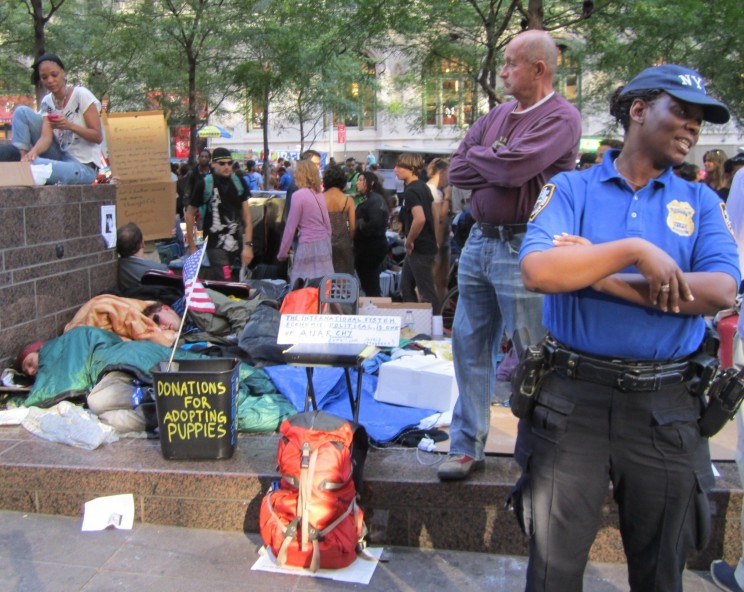
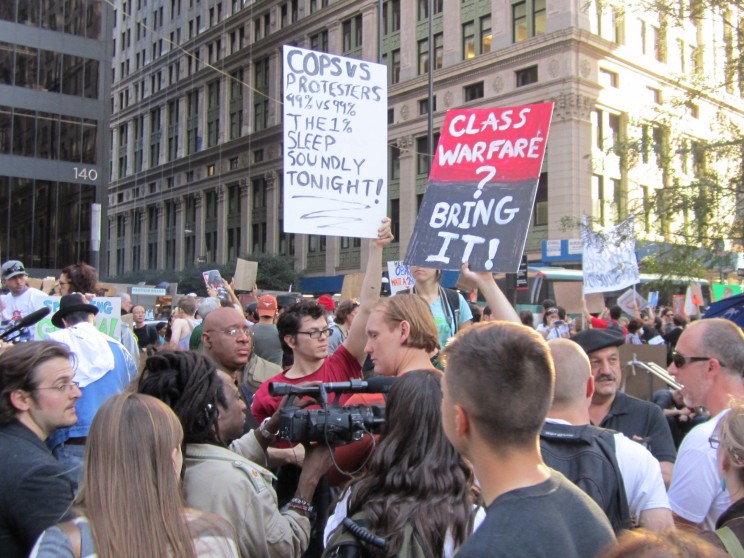
Though the occupation was initially ignored by mainstream media after it began in September, the protest movement attracted favorable attention both nationwide and internationally. Arrests flared in other U.S. cities, notably Oakland, California, where protesters tried to recall a famous general strike of 1946 by marching to the port. But unlike in Oakland, and Portland, Oregon, the encampment at Wall Street survived the constant threat of being rousted by police action on the one hand and cold weather on the other without death, disaster or dishonor.
An official order to clear Zuccotti Park was squelched in October by the intervention of local city council members and other politicians—some of whom, not coincidentally, plan to run for office in the 2012 elections. Many local labor unions support the movement, suggesting that alliances may be possible across “police and firefighter” lines. This kind of alliance recently won a referendum in Ohio overturning a state law that would have limited public unions’ collective bargaining rights.
In Zuccotti Park protesters formed a tiny city within the city. Food, clothing and books were donated and handed out. Electric generators that were confiscated by the fire department were returned after volunteer attorneys complained on the protesters’ behalf. For public safety the occupiers relied on volunteer security guards who used nonviolent techniques to confront, isolate and occasionally expel troublemakers. Women and transgender protesters could, if they wished, sleep in separate tents. Before November 15, few people were arrested by the police for allegedly committing sexual or physical assault.
New Yorkers quickly became accustomed to this remarkably peaceful microcosm of urban life. On sunny weekend afternoons tourists thronged Zuccotti Park and its celebrated neighbors, the World Trade Center site on one side and the financial district on the other. I have never seen Lower Manhattan look more vibrant.
But Occupy Wall Street was only one of Manhattan’s tourist attractions. To put support for the movement’s proposed reforms in a realistic perspective it is suggestive to look at other sites in the city and the desires that they apparently fulfill.
Nearly 50 million men and women are visiting New York City this year. Nearly 50,000 of them ran in the recent New York City Marathon sponsored by ING Bank .
While protesters occupied Zuccotti Park in tents, the average price of a hotel room in New York City is $250 and the hotel occupancy rate is
0 Comments on Memo from Manhattan: Occupying Wall Street—and Fifth Avenue as of 1/1/1900
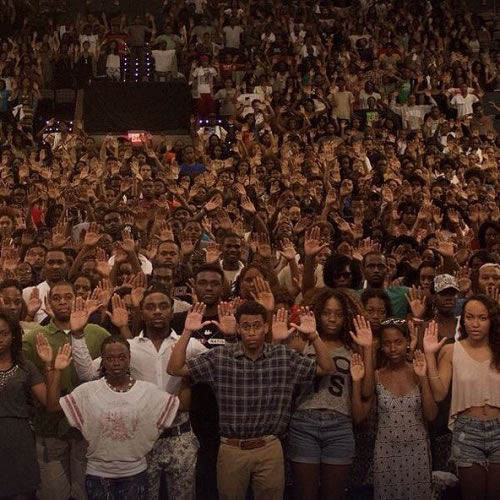












 On Tuesday, the Occupy Wall Street (OWS) librarians
On Tuesday, the Occupy Wall Street (OWS) librarians 



 In a
In a  American Library Association (ALA) president Molly Raphael
American Library Association (ALA) president Molly Raphael 


 The NYPD have raided the Occupy Wall Street camp in Zuccotti Park, tossing tents, tarps, pallets, sleeping bags and
The NYPD have raided the Occupy Wall Street camp in Zuccotti Park, tossing tents, tarps, pallets, sleeping bags and  In
In 



Thanks so much for co-curating the film festival with me, Betsy, and thanks especially for putting up that “This American Life”-style RING OF ENDLESS LIGHT — I was so disappointed that we ran out of time and couldn’t show it! Next year I’ll have a better sense of timing…
Do you know about the Phantom Tollbooth documentary funded through Kickstarter?
http://www.kickstarter.com/projects/phantomtollbooth/the-phantom-tollbooth-turns-50-a-documentary It seems to have reached the goal but there are still 7 days left to pledge and there are some sweet incentives.
Also- that AFP performance was meant for me too I am a long-time fan of Neil, I stood in line for hours to get him to sign Death and Sandman graphic novels for me back in the day! Because of him, I discovered Amanda when they worked together on Who Killed Amanda Palmer? Now I love them both.
I am a long-time fan of Neil, I stood in line for hours to get him to sign Death and Sandman graphic novels for me back in the day! Because of him, I discovered Amanda when they worked together on Who Killed Amanda Palmer? Now I love them both.
Thank you so much for sharing my Ira Glass-inspired contribution to the 90-Second Newbery festival! It gave me a wonderful thrill to see it on your blog and I appreciate the lovely compliment. I wish I could have been in New York for the festival, and I can’t wait to see your coverage of the event.
I LOVE Bone Dog. I read it to my schoolchildren last week, and they loved it, too. It spans the different ages beautifully, and many children remarked on the beauty of the illustrations. It’s a big, generous book–funny, sad, spooky, imaginative, with a denouement that’s both logical and surprising. It’s my favorite for the Caldecott–quite simply a perfect book.
Betsy, thank you so much for posting my video with Eric Rohmann. I love BONE DOG, and hope for many good things to happen for it, and for Eric too.